What Are the Challenges of Ferret Ownership?

Challenges of Ferret Ownership:
Understanding their boundless energy, mischievous escapades, and unique care needs can test even the most patient pet owners.
High Energy Levels and Playfulness
Are you ready to dive into the world of energetic and playful ferrets? These furry friends are full of life and love to play! Let’s explore how to keep them happy and healthy with plenty of fun activities and engagement.
- Ferrets are known for their high energy levels and love for playtime. They need lots of attention and stimulation to stay happy and active.
- To keep your ferret entertained and mentally sharp, it’s essential to dedicate time each day for play and interaction.
- Interactive toys like tunnels, balls, and puzzle feeders can provide hours of fun for your furry friend.
- Creating safe spaces for your ferret to explore, climb, and hide can prevent boredom and destructive behaviors.
- Social interaction with your ferret is also crucial for their well-being. Make sure to spend quality time bonding with them every day.
Mischievous Behavior and Exploration
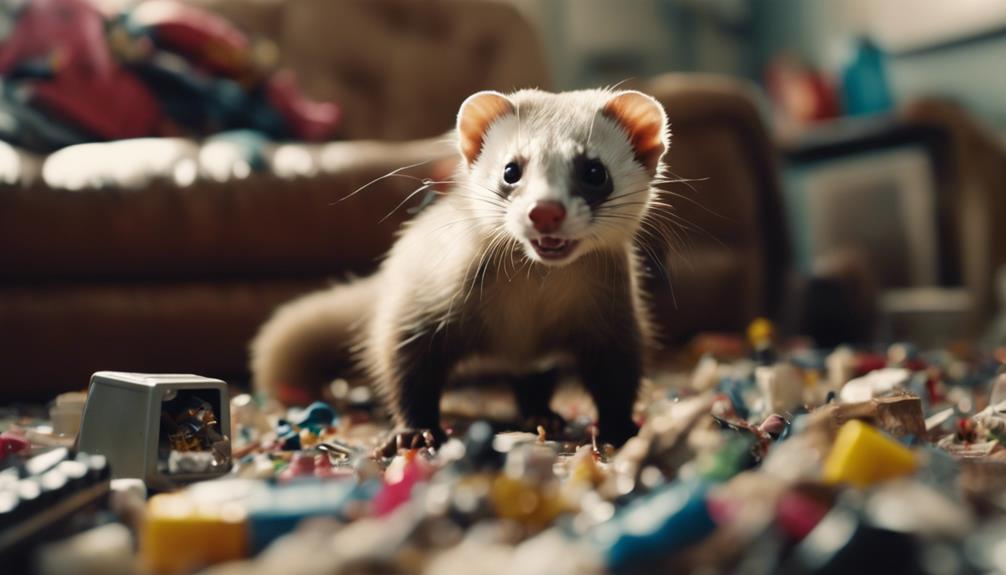
Are you curious about why your energetic ferret loves exploring every corner of your home? Let’s uncover the reasons behind their mischievous behavior and how to keep them safe and entertained!
Why are ferrets so mischievous?
- High energy levels and playfulness drive a ferret’s mischievous behavior.
- Their natural curiosity leads them to get into trouble around the house.
How can you address their behavior?
- Implement training methods and engagement techniques to channel their energy positively.
- Provide interactive toys, tunnels, and hiding spots to keep them entertained.
Why is supervision crucial?
- Ferrets can squeeze into tight spaces and investigate hazardous areas.
- Monitoring their exploration helps prevent dangerous situations.
What preventative measures can you take?
- Secure cabinets and block small openings to keep them safe.
- Remove toxic plants or substances from their reach for a safer environment.
Specialized Dietary Requirements
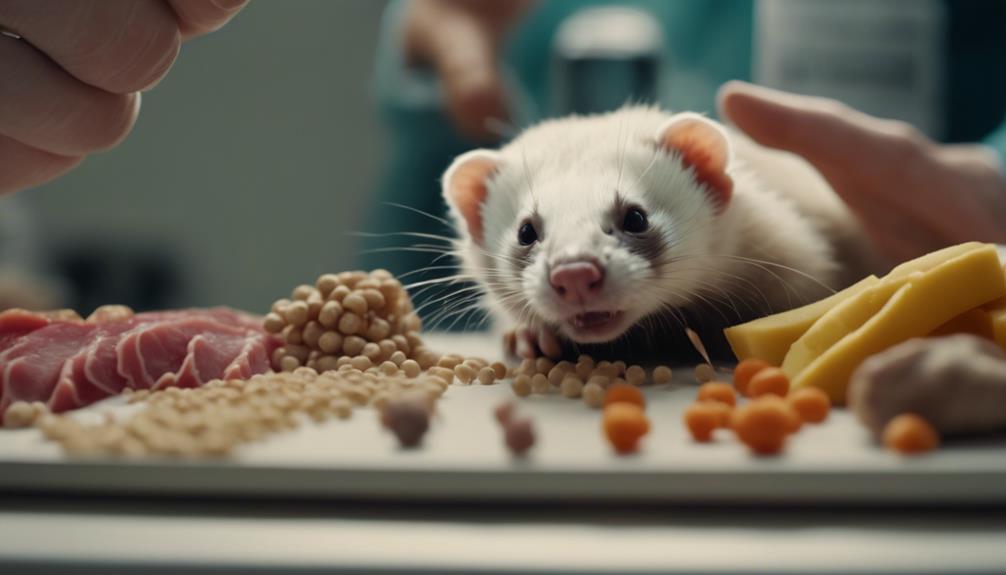
Are you curious about what ferrets need to eat to stay healthy and happy? Let’s dive into the world of specialized dietary requirements for these adorable pets!
Ferrets are picky eaters, and they need a special diet to keep them in top shape. They’re meat-lovers, so their meals should be packed with animal proteins and fats.
Protein is super important for ferrets. They thrive on proteins from animals like chicken, turkey, and organ meats. These foods help them grow strong and healthy.
Fats are essential for ferrets too. They give them energy and make their fur shiny and soft. It’s like a beauty treatment from the inside out!
Watch out for foods high in carbs! These can cause trouble for ferrets, like insulinoma. To keep them feeling good, they need to eat small meals throughout the day because they burn through their food fast.
To make sure your ferret is getting the right nutrients, talk to a vet. They can help you create a meal plan that’s perfect for your furry friend’s needs.
Nipping and Biting Tendencies
Unraveling the Mystery of Ferret Nipping and Biting
Hey there, ferret enthusiasts! Have you ever wondered why your furry friend likes to give little nips or bites? Well, let’s dive into the world of ferret behavior to find out more about these tendencies and how to handle them like a pro!
- What’s the Deal with Nipping and Biting?
Ferrets use their mouths to explore and communicate, just like how we use our hands. It’s their way of interacting with the world around them.
- Training Tips for a Bite-Free Bond
Using positive reinforcement, like treats and toys, can teach your ferret that gentle interactions are the way to go. Encouraging good behavior helps them understand what’s expected.
- Redirecting Unwanted Behavior
If your ferret gets a little too nippy, redirect their attention with toys or fun playtime. This helps shift their focus away from biting and onto more suitable activities.
- Socializing for Success
Properly socializing your ferret when they’re young can work wonders in reducing nipping tendencies. Regular handling and gentle interactions show them the right way to interact with their human pals.
Odor Control and Litter Training
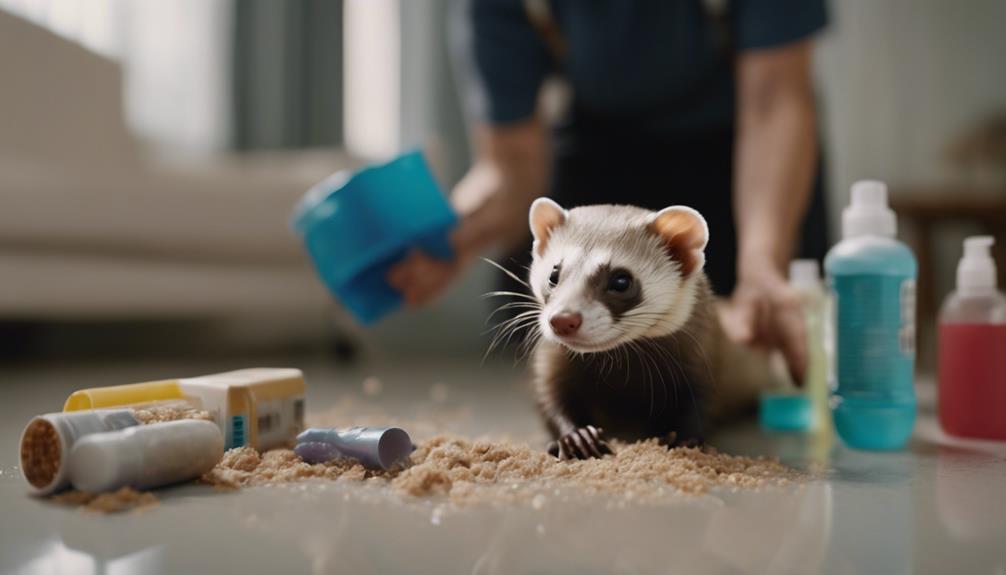
Ferret owners often face challenges with odor control and litter training. Implementing effective odor management tips can help keep the living space fresh and pleasant.
Additionally, mastering proper litter training techniques is essential for maintaining cleanliness and hygiene in the ferret’s environment.
Odor Management Tips
Are you tired of dealing with the stinky odors that come with owning a ferret? Don’t worry, we’ve got you covered with some simple tips to help you manage and reduce those unwanted smells!
- Cleanliness is Key: Keeping your ferret’s living space clean is essential for controlling odors. Make sure to clean the litter box and surrounding areas regularly to minimize odors.
- Hygiene Matters: Just like us, ferrets need to stay clean too! Grooming and bathing your ferret when needed can help reduce odors and keep them smelling fresh.
- Natural Solutions: Explore natural remedies and products designed for odor control. These can help neutralize odors and keep your ferret’s space smelling great.
Effective Litter Training
Are you tired of dealing with ferret odors and messes? Litter training your ferret is the key to a clean and odor-free environment. Let’s dive into some easy tips to help you successfully litter train your furry friend:
- Secure Litter Box: Use a secure litter box to prevent messes outside the box.
- Daily Cleaning: Make sure to clean the litter box daily to encourage your ferret to use it.
- Ferret-Safe Litter: Use litter that’s safe for ferrets to avoid any health issues.
- Reward Good Behavior: Reward your ferret for using the litter box to reinforce positive habits.
- Be Patient and Consistent: Patience and consistency are key to helping your ferret learn faster.
Veterinary Care and Health Concerns
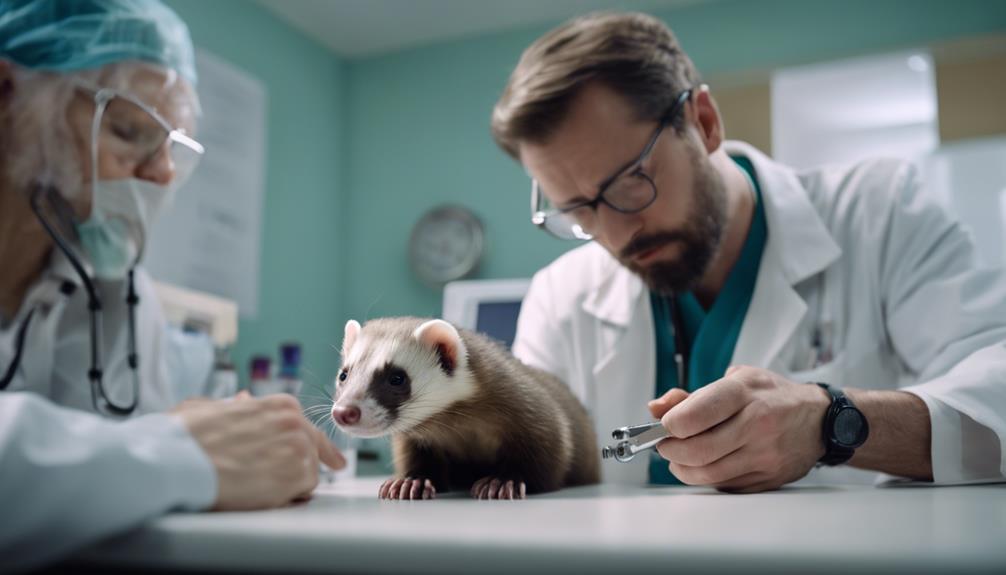
Are you taking good care of your ferret’s health? Let’s talk about how to keep your fuzzy friend happy and healthy!
- Keeping Up with Check-ups: Just like you visit the doctor, ferrets need regular check-ups too! It’s important to take them to the vet for vaccinations against diseases like canine distemper and rabies. These shots help keep your ferret safe and healthy.
- Watch Out for Common Issues: Ferrets can get sick just like us. They might’ve problems like adrenal disease, insulinoma, or tummy troubles. But don’t worry! With the right treatment, like medicine, surgery, or diet changes, your furry buddy can feel better.
- Stay on Top of Their Health: Pay attention to your ferret’s weight, eating habits, and behavior. If something seems off, it’s time for a trip to the vet. A vet who knows about ferrets can give the best care possible.
Taking care of your ferret’s health is essential for a long and happy life together. Remember, a healthy ferret is a happy ferret!
Socialization and Interaction Needs
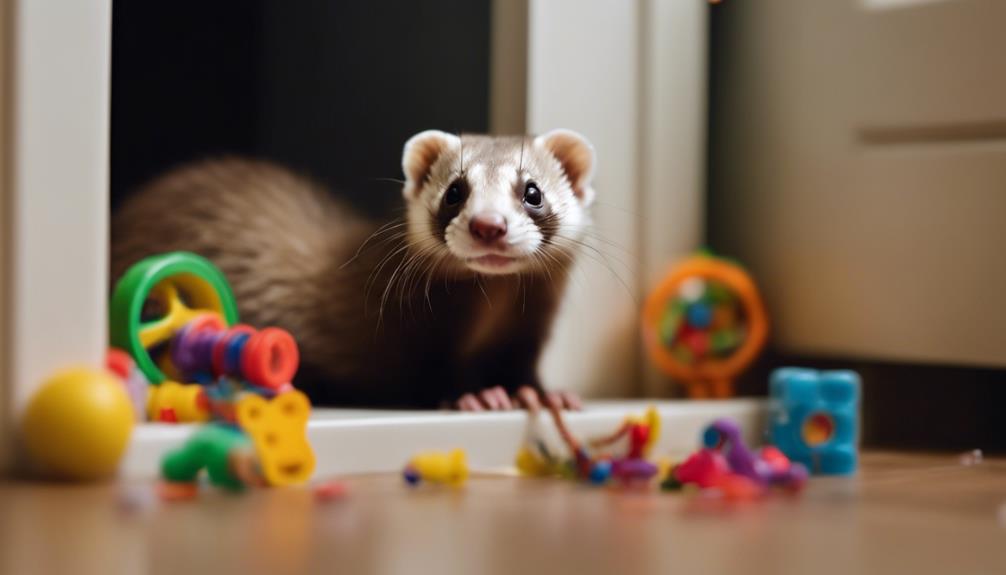
Let’s Make Your Ferret Happy!
Do you want your ferret to be as happy as can be? Well, it’s not just about food and shelter. Your fuzzy friend also needs socializing and playtime to stay cheerful and healthy. Here’s how you can make sure your ferret is having a blast:
- Playtime Galore: Your ferret loves to play, so get some interactive toys to keep them entertained.
- Out-of-Cage Adventures: Let your ferret explore outside their cage for some excitement.
- Hide-and-Seek Fun: Play hide-and-seek with your ferret for a thrilling bonding experience.
To bond with your ferret, try these activities:
- Gentle Petting: Show your ferret some love with gentle petting sessions.
- Grooming Together: Bond with your ferret by grooming them and sharing those special moments.
- Training Time: Teach your ferret new tricks together to strengthen your bond.
By giving your ferret these socialization and interaction opportunities, you’re not only ensuring their happiness but also building a stronger bond with your furry friend.
Frequently Asked Questions
Can Ferrets Be Trained to Use a Litter Box Like Cats?
Ferrets can be trained to use a litter box like cats with patience and consistency. Potty training poses challenges but employing positive reinforcement, using appropriate litter, and placing multiple boxes in various locations can aid in successful training.
Do Ferrets Require Specific Grooming or Hygiene Routines?
Ferrets require regular grooming to manage shedding and maintain hygiene. This includes brushing to reduce fur buildup and bathing occasionally. Nail trimming is essential to prevent overgrowth and potential injuries. Proper grooming routines are crucial for ferret care.
How Do You Introduce a New Ferret to an Existing Ferret in the Household?
When introducing a new ferret to the household, start by creating a neutral territory. Slowly introduce them under supervision to minimize aggression. Utilize socialization training techniques to help them bond and establish a harmonious environment.
Are There Any Common Health Issues That Ferrets Are Prone To?
Ferrets have specific nutritional needs and exercise requirements to maintain their health. Common health issues include adrenal gland disease, insulinoma, and gastrointestinal problems. Regular veterinary check-ups and a balanced diet can help prevent these issues.
Can Ferrets Be Left Alone for Long Periods of Time or Do They Require Constant Attention?
Ferrets require playtime supervision and socialization for their well-being. Enrichment activities are essential to keep them mentally stimulated. Ferret behavior thrives on interaction, making constant attention necessary for their happiness and overall health.











